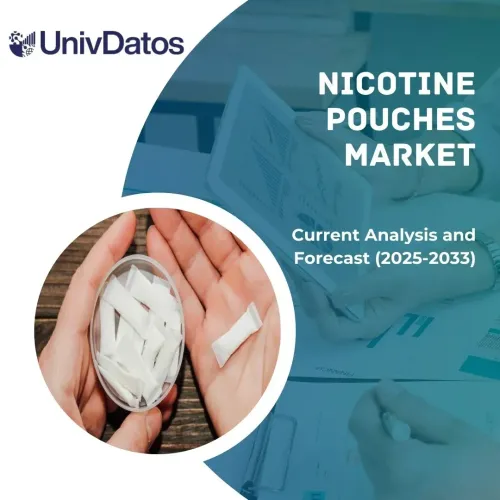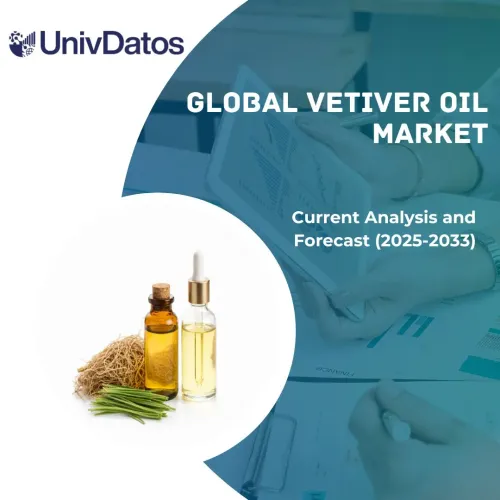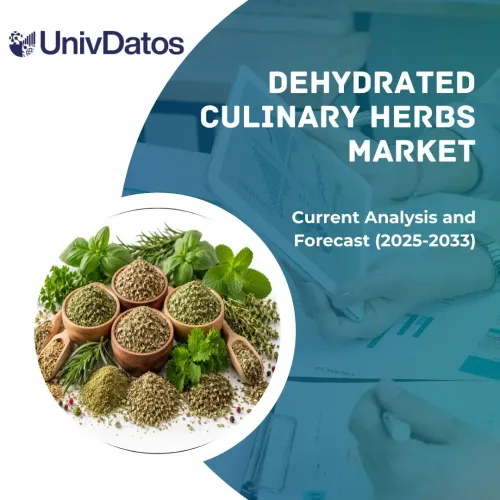- Home
- About Us
- Industry
- Services
- Reading
- Contact Us
Tea Extract Market: Current Analysis and Forecast (2025-2033)
Emphasis on Extract Type (Green Tea Extract, Black Tea Extract, Oolong Tea Extract, and Others); Form (Powder, Liquid, and Encapsulated); Category (Conventional and Organic); Application (Food & Beverages, Pharmaceutical, Nutraceutical, Cosmetics & Personal Care, and Others) and Region/Country
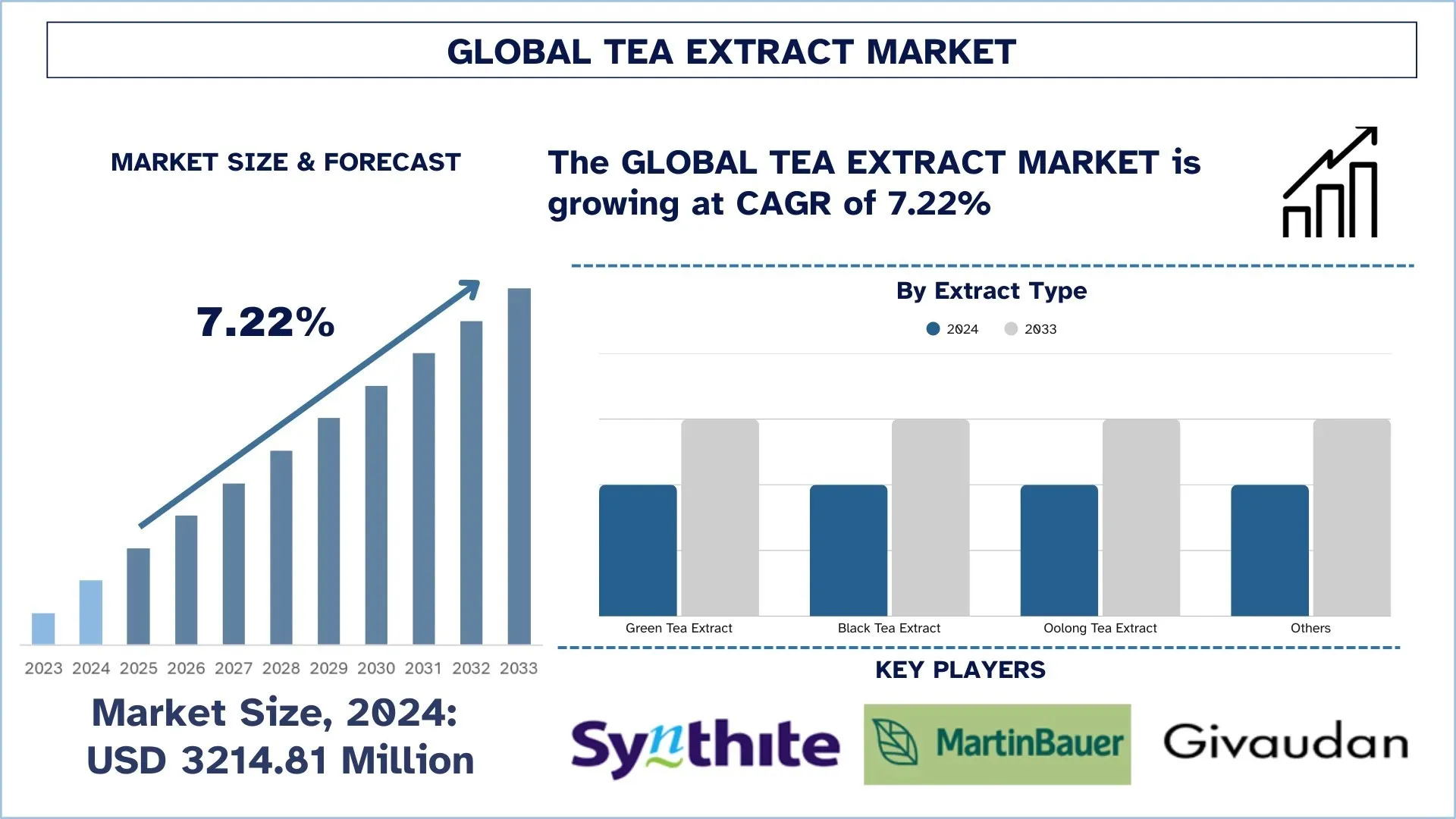
Global Tea Extract Market Size & Forecast
The Global Tea Extract Market was valued at USD 3,214.81 million in 2024 and is expected to grow at a robust CAGR of around 7.22% during the forecast period (2025-2033F), due to the rising demand for clean-label ingredients and ready-to-drink beverages among consumers.
Tea Extract Market Analysis
Tea is the second most-consumed drink globally. In the traditional era, tea was used for medical treatment, and then slowly it gained popularity among consumers and emerged as a cultural practice. For example, the Chinese tea ceremony is a way of showing respect to elders, hospitality, and building social connections. Nowadays, tea is not only a consumable drink, but it is also used in many sectors and industries for the development of products, such as skin care products and medicine preparation. However, tea extracts are most preferred by industries in the preparation of products. Due to the presence of bioactive compounds such as epigallocatechin gallate (EGCG) at high levels. EGCG shows anti-inflammatory, anti-tumor, and antioxidant properties. It helps prevent cardiovascular diseases, manage weight, and regulate metabolism. Food and beverage industries prefer tea extract due to its soluble nature, which gives natural color and flavor to the product. Hence, acts as a nutritious compound and a satisfying clean-label program.
Global Tea Extract Market Trends
This section discusses the key market trends that are influencing the various segments of the global tea extract market, as found by our team of research experts.
Technological Advancement in Extraction Method
Among the major trends in the tea extract market, technological advancement in the extraction method is the most prominent one. With advanced technological techniques such as supercritical CO2 extraction, ultrasonic-assisted extraction, and membrane, it is possible to produce large amounts of bioactive compounds such as EGCG and catechins. With a reduction in bitterness and caffeine level, the purity of the compound is improved. For example, PurTea produces highly soluble and less bitter green tea extract. For instance, in June 2024, Taiyo International relaunched its product Sunphenon TH30. It is a L-theanine-rich green tea extract that can be utilized in supplementary food, dairy products, and beverages.
Tea Extract Industry Segmentation
This section provides an analysis of the key trends in each segment of the global tea extract market report, along with forecasts at the global, regional, and country levels for 2025-2033.
The Green Tea Extract Market Dominates the Tea Extract Market
Based on extract type, the tea extract market is segmented into green tea extract, black tea extract, oolong tea extract, and others. In 2024, the green tea extract dominated the market. These extracts are rich in antioxidants, antivirals, and polyphenol compounds, such as epigallocatechin-3-gallate (ECGC). It helps protect cells from damage, prevents cardiovascular diseases, controls metabolism levels, and lowers the risk of cancer. These properties have increased their demand among people. In addition, many industries and sectors, such as dietary supplements, pharmaceuticals, and cosmetics, utilize the extract in their products. For example, green tea extract is used for the preparation of weight management capsules, tablets, and powders in the dietary supplements sector. While the cosmetic sector used the extract in its anti-aging products.
The Powder Segment Dominates the Tea Extract Market.
Based on form, the tea extract market is segmented into powder, liquid, and encapsulated. The powder segment held the largest market share in 2024. Due to its long shelf life, ease of transportation, storage efficiency, and versatility, industries and sectors prefer it. The food and beverage industries use powder form in their products, such as smoothies, energy drinks, and iced tea, due to its soluble nature. Further, it enhances the color and flavor of the product. Nutraceutical and pharmaceutical industries prefer using powder form extract due to its transformable nature. Additionally, consumers are increasingly seeking supplements that are easy to carry and provide an exact dosage for weight management, metabolism management, and boosting immunity.
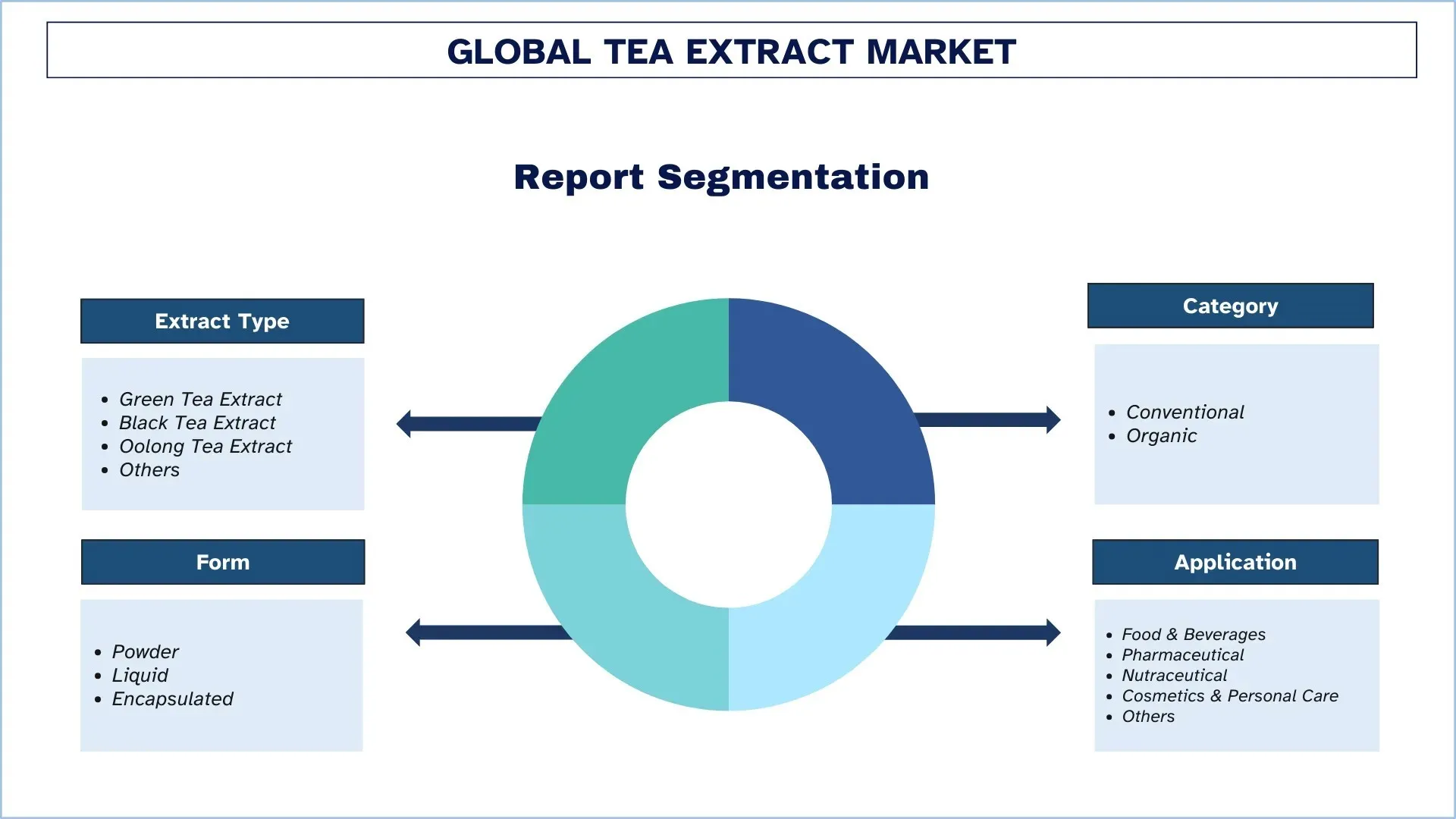
Asia Pacific Dominated the Global Tea Extract Market
The Asia-Pacific tea extract market dominated the global tea extract market in 2024 and is forecasted to remain in this position in the forecast period. This is due to the bulk manufacturing and utilization of tea, ensuring a continuous-flow chain between consumers and manufacturers, the availability of raw material, and fulfilling the demand of various industries, including food & beverages, pharmaceuticals, and nutraceuticals. Additionally, tea is a cultural product of this region, as it is a highly consumed product among the people. This trend favors food and beverage companies to introduce new tea-related products, such as instant tea and dairy products, which will gradually gain the attention of consumers. For instance, in March 2024, the Indian government allotted the budget of Rs 528.97 crore for the Tea Development & Promotion Scheme. The schemes planned on creating 800 self-help groups (SHGs) and 330 farmer-producer organizations (FPOs), further improving value and volume. Moreover, to foster the tea market globally, the government will provide a fund of Rs 72.42 crore.
China held a dominant Share of the Asia-Pacific Tea Extract Market in 2024
China leads the tea extract market due to large-scale manufacturing and a robust distribution network. The tea extract market is fueled by a strong production infrastructure and favorable climatic conditions. This further ensures the continuous flow of the supply chain. Additionally, government programs and private investment are driving the market. For instance, on July 25, the Zhejiang province of eastern China issued guidelines, “Implementation opinions on Accelerating High-Quality Development of Tea Industry,” for expanding the tea plantation process. By using modern techniques, improving the distribution network, enhancing policy support, and industry supervision, the tea extract market can be expanded significantly. Furthermore, the rise of new beverage brands due to the increasing demand for healthy drinks is boosting domestic revenue for tea extraction technologies and the launch of new products. For example, in July 2024, Dayao Soda launched its new sugar-free tea, “Chayuan Xiang,” made for raw tea leaf extraction. Available in three different flavors: ordinary oolang, white orchid oolang, and golden osmanthus oolang.
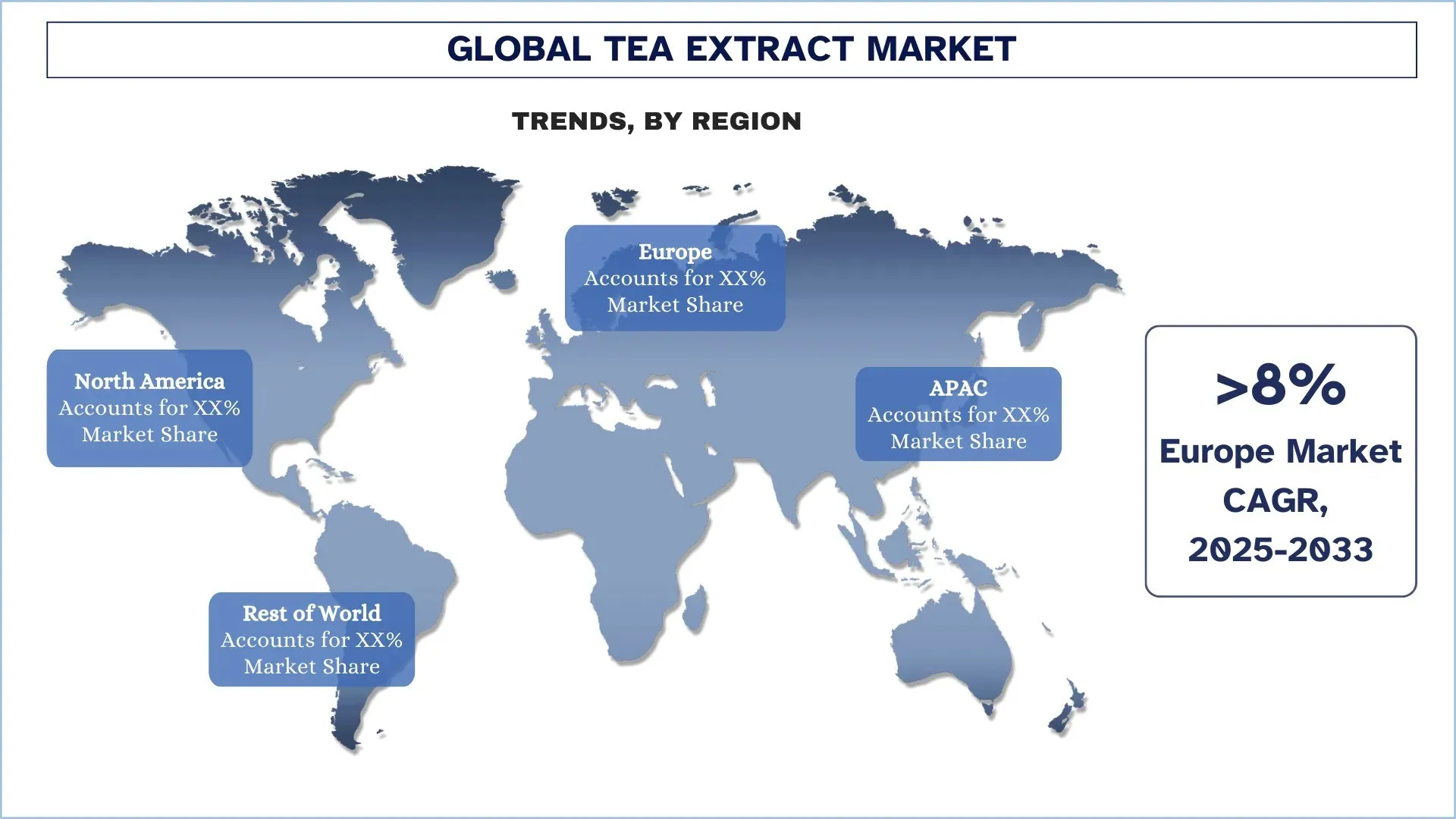
Tea Extract Competitive Landscape
The global tea extract market is competitive, with several global and international market players. The key players are adopting different growth strategies to enhance their market presence, such as partnerships, agreements, collaborations, new product launches, geographical expansions, and mergers and acquisitions.
Top Tea Extract Companies
Some of the major players in the market are Synthite Group, MartinBauer, Givaudan, Finlays, International Flavors & Fragrances Inc. (IFF), Botanic Healthcare, Synergy Flavors, Inc. (Carbery Group), BLUEBERRYAGRO, Hälssen & Lyon, and Cymbio Pharma Pvt Ltd.
Recent Developments in the Tea Extract Market
In July 2025, Fresh Beauty launched its new product, Fresh Black Tea Serum. Enriched with Mauritius black tea extract, the product will help in reducing wrinkles and promote even skin tone.
In 2024, Shiseido launched beauty-from-within supplements containing ginseng extract, green tea extract, and GABA, which is a drinkable product.
In September 2023, Otsuka Pharmaceutical and Bonafide Health, LLC launched their new product, Thermalla. The product contains curcumin extract, decaffeinated green tea extract, and spirulina extract. The product was designed to promote women's health.
Global Tea Extract Market Report Coverage
Report Attribute | Details |
Base year | 2024 |
Forecast period | 2025-2033 |
Growth momentum | Accelerate at a CAGR of 7.22% |
Market size 2024 | USD 3,214.81 Million |
Regional analysis | North America, Europe, APAC, Rest of the World |
Major contributing region | Asia-Pacific is expected to dominate the market during the forecast period. |
Key countries covered | U.S., Canada, Germany, U.K., Spain, Italy, France, China, Japan, South Korea, and India |
Companies profiled | Synthite Group, MartinBauer, Givaudan, Finlays, International Flavors & Fragrances Inc. (IFF), Botanic Healthcare, Synergy Flavors, Inc. (Carbery Group), BLUEBERRYAGRO, Hälssen & Lyon, and Cymbio Pharma Pvt Ltd. |
Report Scope | Market Trends, Drivers, and Restraints; Revenue Estimation and Forecast; Segmentation Analysis; Demand and Supply Side Analysis; Competitive Landscape; Company Profiling |
Segments Covered | By Extract Type, By Form, By Category, By Application, By Region/Country |
Reasons to Buy the Tea Extract Market Report:
The study includes market sizing and forecasting analysis confirmed by authenticated key industry experts.
The report briefly reviews overall industry performance at a glance.
The report covers an in-depth analysis of prominent industry peers, primarily focusing on key business financials, type portfolios, expansion strategies, and recent developments.
Detailed examination of drivers, restraints, key trends, and opportunities prevailing in the industry.
The study comprehensively covers the market across different segments.
Deep dive regional-level analysis of the industry.
Customization Options:
The global tea extract market can further be customized as per the requirements or any other market segment. Besides this, UnivDatos understands that you may have your own business needs; hence, feel free to contact us to get a report that completely suits your requirements.
Table of Content
Research Methodology for the Global Tea Extract Market Analysis (2023-2033)
We analyzed the historical market, estimated the current market, and forecasted the future market of the global tea extract market to assess its application in major regions worldwide. We conducted exhaustive secondary research to gather historical market data and estimate the current market size. To validate these insights, we carefully reviewed numerous findings and assumptions. Additionally, we conducted in-depth primary interviews with industry experts across the tea extract value chain. After validating market figures through these interviews, we used both top-down and bottom-up approaches to forecast the overall market size. We then employed market breakdown and data triangulation methods to estimate and analyze the market size of industry segments and sub-segments.
Market Engineering
We employed the data triangulation technique to finalize the overall market estimation and derive precise statistical numbers for each segment and sub-segment of the global tea extract market. We split the data into several segments and sub-segments by analyzing various parameters and trends, including extract type, form, category, application, and regions within the global tea extract market.
The Main Objective of the Global Tea Extract Market Study
The study identifies current and future trends in the global tea extract market, providing strategic insights for investors. It highlights regional market attractiveness, enabling industry participants to tap into untapped markets and gain a first-mover advantage. Other quantitative goals of the studies include:
Market Size Analysis: Assess the current market size and forecast the market size of the global tea extract market and its segments in terms of value (USD).
Tea Extract Market Segmentation: Segments in the study include areas of extract type, form, category, application, and regions.
Regulatory Framework & Value Chain Analysis: Examine the regulatory framework, value chain, customer behavior, and competitive landscape of the tea extract industry.
Regional Analysis: Conduct a detailed regional analysis for key areas such as Asia Pacific, Europe, North America, and the Rest of the World.
Company Profiles & Growth Strategies: Company profiles of the tea extract market and the growth strategies adopted by the market players to sustain the fast-growing market.
Frequently Asked Questions FAQs
Q1: What is the global tea extract market current market size and its growth potential?
The global tea extract market was valued at USD 3,214.81 million in 2024 and is projected to grow at a CAGR of 7.22% from 2025 to 2033, driven by rising demand for functional beverages, dietary supplements, and clean-label products.
Q2: Which segment has the largest share of the global tea extract market by Extract Type?
Green tea extract dominates the global market due to its high concentration of antioxidants, catechins, and polyphenols, making it widely used in beverages, supplements, cosmetics, and pharmaceuticals.
Q3: What are the driving factors for the growth of the global tea extract market?
Top growth drivers of the tea extract market include:
• Rising demand for ready-to-drink beverages such as iced teas, energy drinks, and flavored waters.
• Increasing preference for natural and clean-label ingredients over synthetic additives.
• Growing health consciousness among consumers seeking immunity-boosting and antioxidant-rich products.
Q4: What are the emerging technologies and trends in the global tea extract market?
Emerging trends in the tea extract market include:
• Rising popularity of organic tea extracts in health-focused food and beverage products.
• Technological advancements in extraction methods like supercritical CO₂, ultrasonic-assisted, and membrane extraction, ensuring higher purity, reduced caffeine, and better taste.
Q5: What are the key challenges in the global tea extract market?
Key challenges in the tea extract market include:
• High production costs linked to advanced extraction processes.
• Fluctuating raw material prices due to climate conditions and supply chain disruptions
Q6: Which region dominates the global tea extract market?
Asia-Pacific dominates the tea extract market (2024), with China, India, and Japan leading consumption and production. This dominance is fueled by strong cultural tea traditions, rising investments in tea-based product innovation, and expanding ready-to-drink tea segments.
Q7: Who are the key players in the global Tea Extract Market?
Some of the leading tea extract Companies include:
• Synthite Group
• MartinBauer
• Givaudan
• Finlays
• International Flavors & Fragrances Inc. (IFF)
• Botanic Healthcare
• Synergy Flavors, Inc. (Carbery Group)
• BLUEBERRYAGRO
• Hälssen & Lyon
• Cymbio Pharma Pvt Ltd.
Q8 What are the key investment opportunities in the global tea extract market?
Rising demand for natural ingredients in functional beverages, nutraceuticals, and personal care creates strong investment opportunities. Investors are increasingly backing companies with advanced extraction technologies, sustainable sourcing practices, and clean-label product innovations.
Q9: How does the regulatory environment affect the global tea extract market?
The tea extract industry is influenced by regional food safety and labeling regulations. For instance, the FDA (U.S.) and EFSA (Europe) require stringent compliance for functional claims, while the Asia-Pacific markets are seeing supportive government initiatives to expand tea production. These regulations affect commercialization speed, product claims, and market entry strategies.
Related Reports
Customers who bought this item also bought


